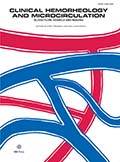Authors: Voisin, Ph. | Chevreaud, C. | Laxenaire, M.C. | Stoltz, J.F.
Article Type:
Research Article
Abstract:
Sixteen arteritic patients at stage II, III and IV according to Fontaine, were treated by isovolemic hemodilution. The procedure consisted of the daily withdrawal of 500 ml of blood, which is replaced by 250 ml of a 4% solution of human albumin and 250 ml of Dextran 40. The procedure was applied, on average, for three days in succession until the patient’s hematocrit reached 0.30. The therapy was carried out over a total of 8 weeks, with fortnightly hemodilution sessions. Improvement was observed in clinical factors: a 100% increase in treadmill performance, disappearance of decubitus pain and wound healings. The
…following biological parameters were studied: plasma albumin and fibrinogen levels, plasma and blood viscosity, red blood cells aggregation index, platelet aggregation, plasma β -thromboglobulin level, platelet MDA and nucleotides concentrations. The results revealed that by the 56th day of treatment, 8 patients had improved, 4 remained stationary and 4 were deteriorated, regardless of etiology or stage of arteritis. With regard to biological parameters (which before IHD, were always impaired), they improved after the first IHD procedure, then returned after two months of IHD Trial to levels some half-way between the values measured before HID and normal values. Physiopathological implications of these clinical and biological results are discussed.
Show more
Keywords: Isovolemic hemodilution, arteriopathy, human albumin, hemorheology, platelet activation, Dextran
DOI: 10.3233/CH-1988-8109
Citation: Clinical Hemorheology and Microcirculation,
vol. 8, no. 1, pp. 47-60, 1988
Price: EUR 27.50





